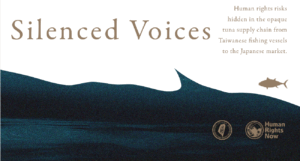Human Rights Now (HRN), a Tokyo-based international human rights NGO, in collaboration with the Taiwan-based NGO Taiwan Association for the Promotion of Human Rights (TAHR), conducted a fact-finding investigation into the risks of forced labor embedded in the supply chains of tuna supplied from Taiwanese distant-water fishing vessels to the Japanese market.
Japan is one of the world’s largest consumers of tuna, and Taiwan is its largest supplier. Taiwan’s distant-water fishing fleet, the second largest in the world, mainly supplies yellowfin, bigeye, and Pacific bluefin tuna to the market, primarily for sashimi tuna, and in 2024, approximately 85% of the sashimi-grade tuna exported from Taiwan 2024 was destined for Japan. However, the supply chains through which tuna caught by these vessels reach the Japanese market are complex and opaque, posing serious potential human rights risks.
It has been confirmed that there may be a potential business link between the fishing vessel You Fu (銪富), suspected of using forced labor, and a major Taiwanese seafood company in the supply chain of Japanese seafood-related companies. Furthermore, another vessel, Yu Shun No. 668 (裕順668), also suspected of using forced labor, has been found to be part of a Japanese company’s ultra-low-temperature longline tuna fishing fleet.
Interviews with former Indonesian crew members of You Fu and Yu Shun No. 668 revealed severe violations of migrant workers’ fundamental rights, including excessively long working hours, non-payment of wages, confiscation of identity documents, deprivation of means of communication, and poor living conditions. Behind such severe labor exploitation are systemic issues in both Taiwan and Japan, as well as institutional deficiencies in the regulatory framework of Indonesia, the primary sending country of crew members.
In addition, a questionnaire survey of 19 Japanese seafood-related companies on their implementation of human rights due diligence practices revealed that, while some companies recognized tuna as a commodity with high human rights risks, they disclose only limited information regarding risk assessments and corrective measures. In particular, grievance mechanisms that migrant workers onboard fishing vessels can actually access are virtually absent, and engagement with NGOs and labor unions was found to be extremely insufficient.
Given that the majority of Taiwan-caught tuna is imported into and consumed daily by the Japanese market, it is highly likely that Japanese companies and their supply chains are deeply involved in these human rights risks. We strongly urge the governments of Japan and Taiwan, as well as relevant companies, to take concrete and swift action to ensure the protection of the rights of migrant workers.
Download the report here: <English> <Japanese (日本語)> <Chinese (中文)>




